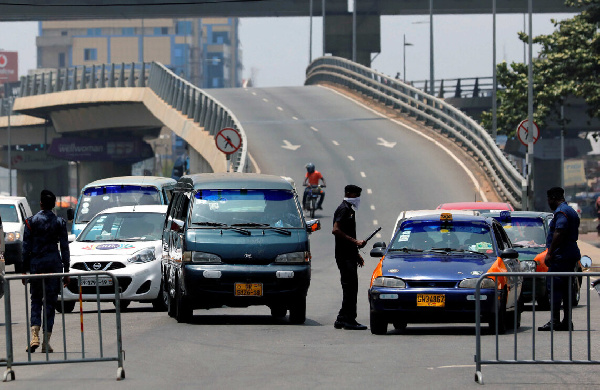Over the past couple of weeks, the latest data suggests that Ghana may be heading into the second wave of Coronavirus infections, just like the ongoing trend in many countries in the western hemisphere. In turn, this is raising worries that government may be forced to respond by re-instituting socio-economic restrictions, including a repeat of the most draconian one of all – a lockdown of the places where a resurgence in infection rates are highest, which also happen to be the country’s most populous and most economically active urban centres.
To be sure, Coronavirus has become synonymous with the year 2020. COVID-19 has triggered the deepest global recession in decades. While the ultimate outcome is still uncertain, the pandemic has resulted in contractions across the vast majority of emerging market and developing economies. It will also do lasting damage to labour productivity and potential output.
Although the health impacts on Sub-Saharan Africa appear minimal, Sub-Saharan Africa has been economically ravaged by the COVID-19 pandemic, likely leading to the sharpest contraction in activity on record. In addition to its heavy toll on health and safety, efforts to contain the spread of the virus—such as travel restrictions, border closures, and national lockdowns—have disrupted the functioning of domestic economies. Economic activities have sharply declined in major trading partners, as well as a collapse in commodity prices, which have weighed heavily on exports. Although growth is projected to recover in 2021, Sub-Sahara Africa is especially vulnerable to a larger and longer-lasting downturn given the weakness of its health care systems, constrained fiscal policy space, and its limited capacity to effectively implement social distancing measures. It is also at risk of debt distress given high levels of debt and sharply higher borrowing costs.
COVID-19 has had a significant impact on countries like Ghana for reasons such as weak health systems, large tourism sectors, balance sheet vulnerabilities to financing shocks, or that are dependent on commodity exports. In Nigeria, and South Africa—the two largest economies in Sub-Sahara Africa—activity has fallen precipitously during the first half of this year. The other economies in the region have also suffered markedly during the first half of 2020.
In addition to domestic disruptions, several industrial commodity exporters have had to cope with weaker external demand and lower prices for oil and metals (Angola, Democratic Republic of Congo, Ghana). Many agricultural commodity exporters have suffered from a collapse in export demand as well as disruptions to supply chains (Côte d’Ivoire, Ethiopia, Kenya). The precipitous fall in global travel as a result of the pandemic has had a particularly severe impact on countries with significant exposure to global travel and tourism (Cabo Verde, Ethiopia, Mauritius, Seychelles).
In the midst of Ghana trying to salvage these economic woes, the Ghana Medical Association (GMA) has warned that Ghana is likely to head into another lockdown if the country’s Coronavirus cases continue to rise. “If we don’t take care of ourselves, and looking at the trajectory, we might have to go back to lockdown but if that can be avoided, why not,” the Deputy General Secretary of the GMA who also doubles as a member of the Infectious Diseases Committee of the Association, Dr. Titus Bayuo told Accra-based Starr FM on Monday, November 9, 2020. “…we are pushing ourselves towards tougher restrictions [i.e. ban on social gatherings, lockdown] and if we get there the political leaders will have no option,” he added.
These pandemic-control measures such as social distancing and self-isolation are made more challenging to implement by the fact that the majority of workers in Ghana are in the informal economy and depend on daily incomes that are insufficient to stockpile food and other essential items. For many, living conditions are also not suited to these measures, as more than two-thirds of urban populations live in crowded slums, and necessities like water are often accessed at communal points.
Further lockdown without external assistance would certainly constrain fiscal space and also limit governments’ ability to respond to the outbreak. The challenges of containing outbreaks and providing fiscal support could both lengthen this year’s economic contraction and significantly delay the expected recovery.
Risk outlooks for 2020 however are firm to the downside. Given the underlying economic vulnerability of the country, a longer-lasting and more severe pandemic would trigger an outright recession. Even if the current pandemic is successfully contained, the evolving second wave of infections could lead us to enter what Dr. Michael Osterholm, the newly appointed Covid-19 advisor to President-elect Joe Biden, calls the “Covid hell”.
Finally, government debt has already risen significantly as a percent of GDP, the composition of debt had also become riskier, with a greater share owed to non-concessional lenders at a higher cost. These strains will be compounded by the increased borrowing required to fund larger deficits and economic stimulation. Borrowing costs are expected to rise sharply given heightened risk aversion, placing further pressure on fiscal capacity. Significantly larger, and more expensive, government debt burdens mean that the risk of sovereign debt defaults has increased, and may rise further if the projected recovery inactivity were to disappoint. Severely constrained government resources, as well as restrictions due to social-distancing measures, could lead to a loss of critical public services during the pandemic and further weigh on activity.
However, there is hope among the business and investment communities that the Government will respond prudently to an emerging second wave and this is illustrated by rising confidence among businesses as revealed by both the latest Bank of Ghana Business Confidence Survey and the latest Association of Ghana Industries Business Barometer Survey. It is also expected that the sub-regional bodies will rise up to these challenges and position Africa as a continent that will rise up successfully to the risk of COVID-19, leveraging fully on the Africa Free Trade Continental Agreement.


